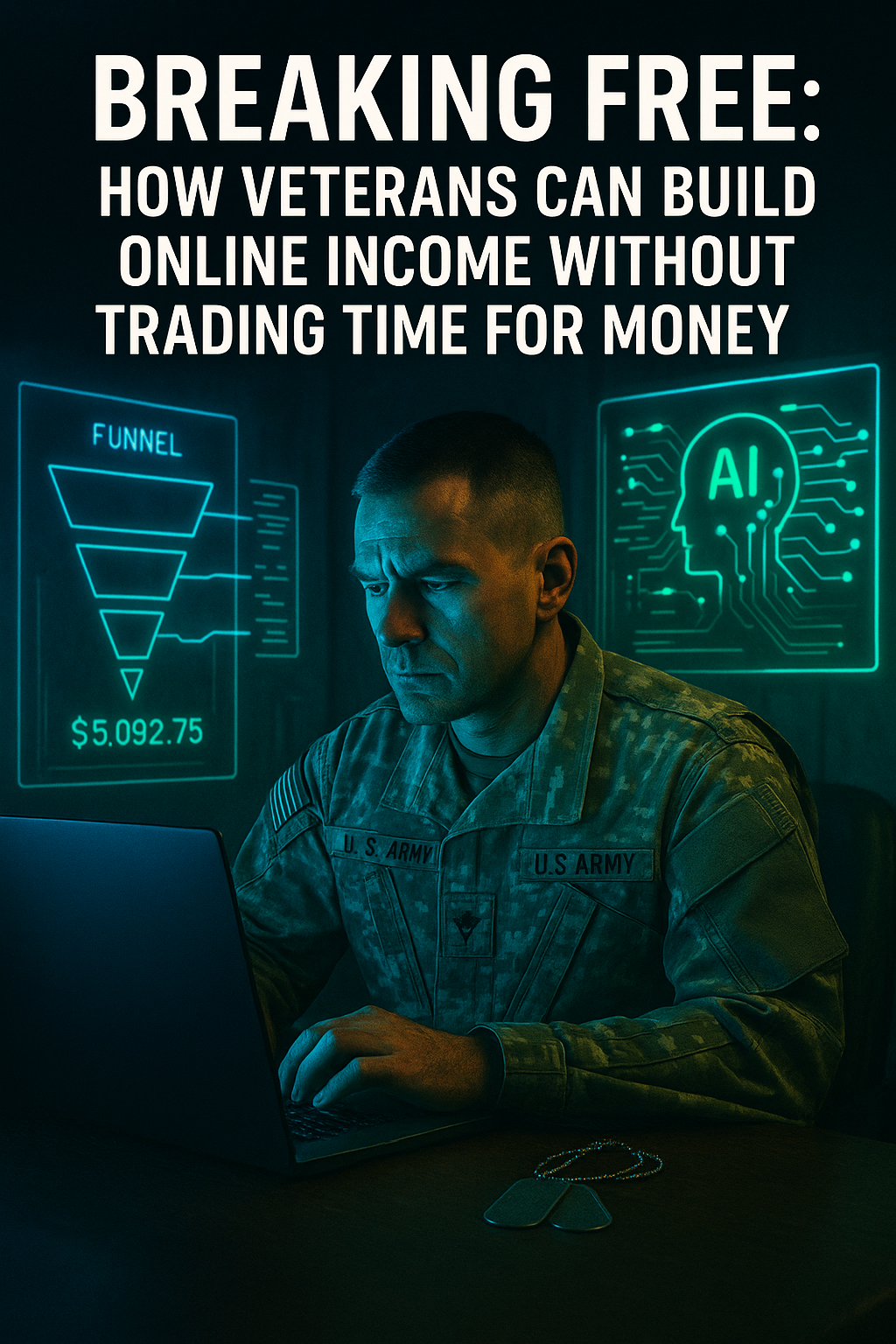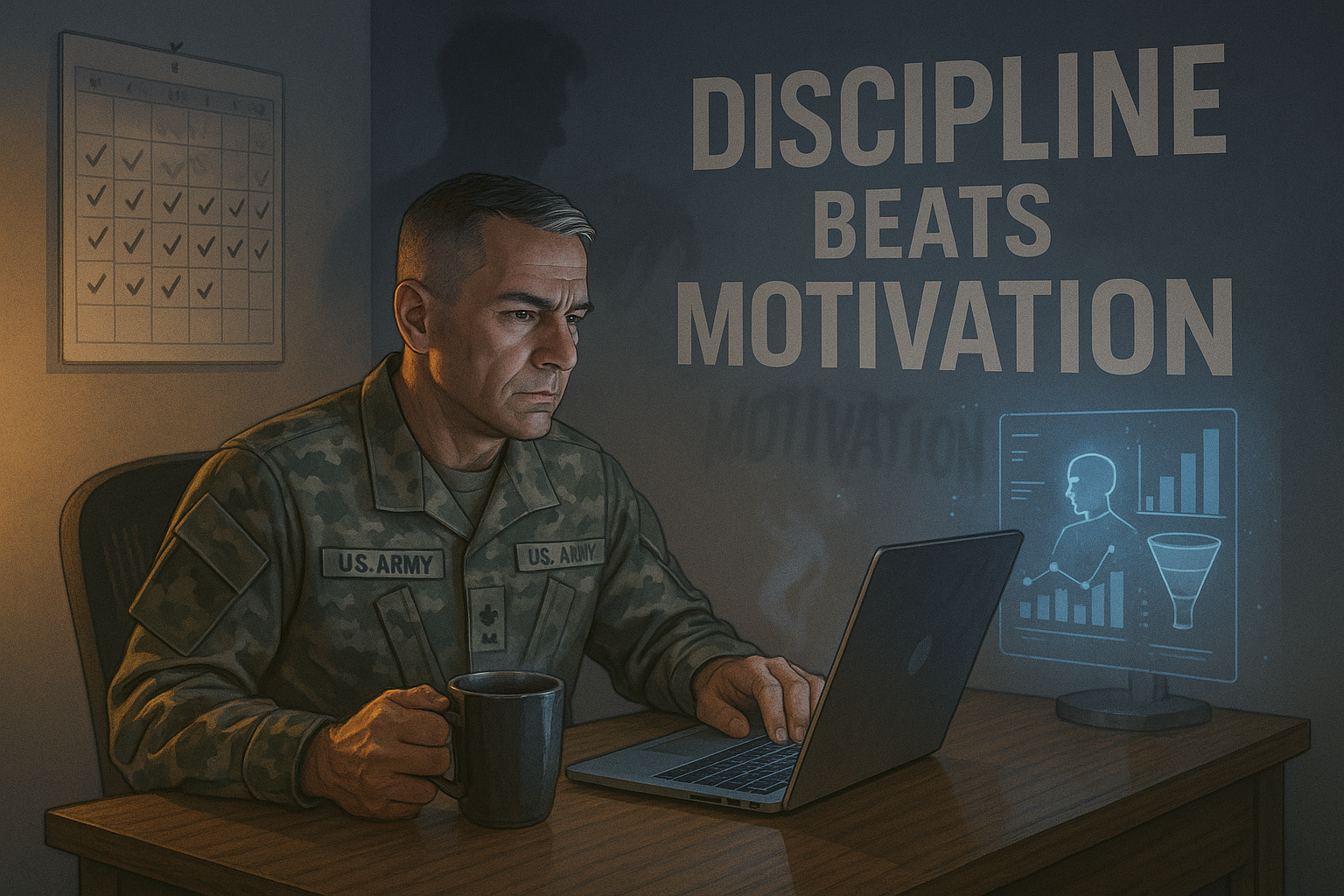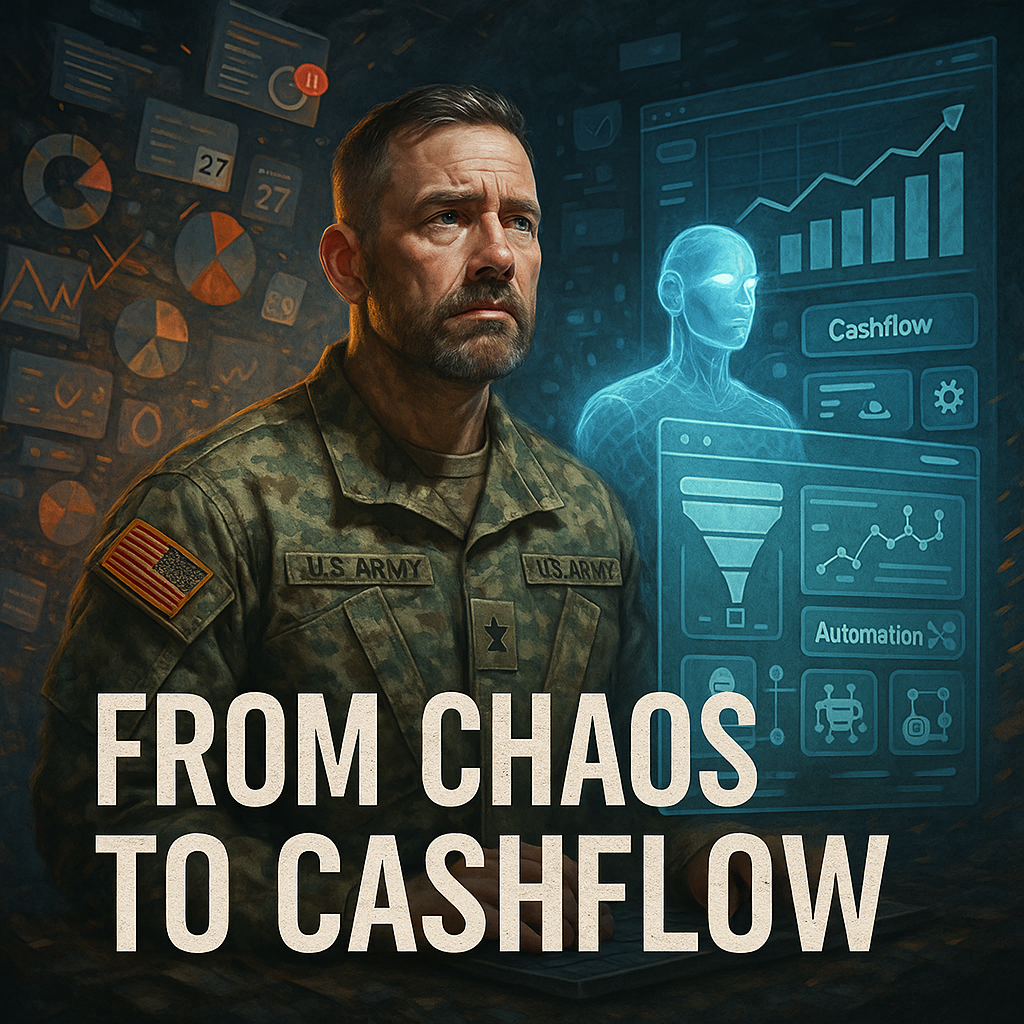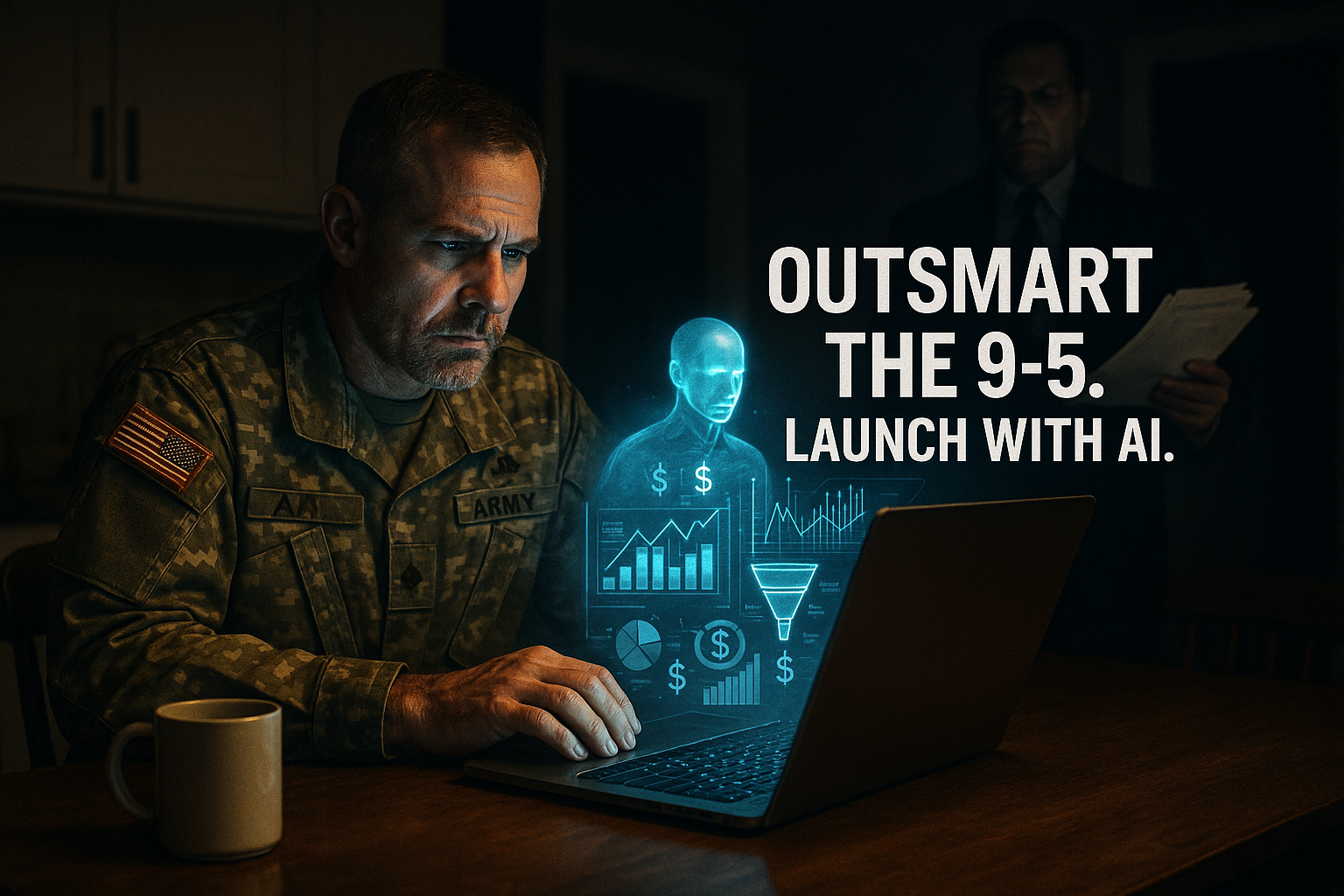Remember the first time you realized you could sleep in past 6 am? For me, it was the day after leaving active duty—no 5k run, no early muster, just a quiet house and the uncomfortable silence of ‘what’s next?’ I thought civilian life would be a victory lap. Instead, it felt like someone handed me a new uniform: the 9-5. If you’re nodding right now, trust me, you’re not alone. But what if the rules of the game are different now? What if, instead of trading hours in a cubicle, you could build a business that works as hard as you do—while you sleep? Let’s unpack what it really means to build income on your terms, not your timesheet.
Section 1: The 9-5 Uniform—Why Most Veterans Feel Out of Place
When I left the military, I believed I was finally stepping into freedom. But it didn’t take long to realize I’d just swapped one uniform for another—the 9-5 grind. On my first day in a cubicle, I sat under those harsh fluorescent lights, staring at a screen, and felt a wave of “cubicle shock.” I’d gone from field ops and purpose-driven missions to clock-watching and endless meetings. It was like trading my camo for khakis but losing the sense of mission that kept me moving forward.
Veterans are wired differently. In the service, we’re trained to take initiative, adapt fast, and lead from the front. We thrive on autonomy and responsibility. But traditional office jobs? They’re built on rigid schedules, timecards, and waiting for someone else’s green light. It can be challenging for individuals accustomed to achieving goals independently. As Adam Smith, Army veteran-turned-entrepreneur, put it:
‘We weren’t trained for ordinary. The 9-5 just felt like trading one uniform for another, minus the purpose.’
It’s no wonder so many veterans feel restless or frustrated in these roles. The skills that made us effective—discipline, leadership, and problem-solving—don’t always fit neatly into a world of status updates and micromanagement. Instead of being empowered, we’re often boxed in. The promise of “job security” in a traditional role can feel more like a cage than a comfort.
That’s why more veterans are looking for something different. Home-based businesses and flexible work schedules are attractive because they offer what we value most: independence, purpose, and the chance to use our veteran skills in meaningful ways. When you run your show, you set the mission. You decide when and how the work will be done. You have the ability to create a life that suits your needs, rather than imposing your own constraints.
There’s a common myth that sticking to the 9-5 is the safest path. But for many of us, it’s just another grind—one that doesn’t honor the initiative and drive we developed in uniform. If you’ve ever felt out of place in a traditional job, you’re not alone. The good news? There are better ways for veteran entrepreneurs to thrive, starting with building a home-based business that leverages your unique strengths.
Section 2: Flipping the Script—Using Online Leverage to Build Passive Income
Here’s the truth: the military taught us discipline, grit, and how to execute a plan—but it never showed us how to make systems work for us. Most of us leave service and walk straight into another grind, trading our time for a paycheck. But online business for veterans is a different game. It’s about building systems that pay you over and over, even when you’re off the clock.
Passive income for veterans isn’t a myth—it’s a mindset shift. I’ve seen real vets turn their hobbies, knowledge, or service skills into automated income streams. Take Jessica Martinez, an Air Force vet who built a home-based business teaching leadership online. She says:
‘Setting up my first evergreen course felt like prepping for a mission—plan, execute, automate, and watch it run itself.’
That’s the power of leverage: work once, get paid many times. Here’s how veterans are making it happen:
Digital Products: Launch a simple eBook, course, or downloadable guide. Set it up with automated funnels, and every sale happens while you’re hiking, wrenching on your truck, or spending time with family.
E-commerce: Sell gear, merch, or custom goods through platforms that handle orders and shipping for you. Automation tools keep your shop running 24/7.
Online Consulting: Package your expertise into group programs or recorded workshops. Use AI scheduling and email automation to handle bookings and follow-ups.
With today’s automation tools and AI, building a home-based business is more accessible than ever. You don’t need to be a tech genius—just be willing to learn the basics and plug into proven systems. Veterans are uniquely positioned for this: we know how to follow a plan, adapt, and execute under pressure.
Imagine launching a digital product once, then earning while you’re out living life. That’s the freedom we fought for—and now, with online business for veterans, it’s finally within reach.
Section 3: Myths, Hiccups, and Horse Sense—What Holds Veterans Back from Online Business
Let's be honest for a moment. If you’re like most veterans I know, you’ve probably heard (or thought) one of these: “I need a business degree to start an online business,” or “I need a big investment up front.” I used to believe those myths too. But here’s the truth: you don’t need an MBA—just a willingness to fail forward and a mission-focused mindset. That’s not just me talking—David Lee, Marine & owner of VetBiz Digital, says it best:
‘You don’t need an MBA—just a willingness to fail forward and a mission-focused mindset.’ — David Lee, Marine & owner of VetBiz Digital
Mythbusting: Degrees and Dollars
Many veterans think business ideas for veterans require fancy credentials or startup grants in the bank. In reality, mentorship, free business training, and trial-and-error are what get you moving. There are numerous veteran success stories that began with nothing more than determination and a laptop. Organizations like Warrior Rising and free SBA online courses exist to bridge any knowledge gap. Startup grants and veteran-specific programs are out there—don’t let lack of funds be your excuse.
What Really Gets in the Way
Tech Anxiety: The idea of building a website or using automation tools can feel overwhelming. Trust me, my first site crashed every time I hit refresh—it was almost comical. But you learn by doing, not by waiting for perfection.
Overwhelm: There’s so much info out there, it’s easy to freeze up. The trick? Pick one thing and take action. You don’t need to master everything at once.
Imposter Syndrome: Many of us dismiss our military experience as irrelevant. In reality, discipline, adaptability, and leadership are the backbone of entrepreneurship.
Horse Sense: The Real Edge
Here’s the kicker: Veterans are built for business. The same skills that got you through tough deployments—resilience, teamwork, and mission focus—are exactly what you need to succeed online. Don’t let myths or hiccups hold you back. Leverage the free business training, mentorship, and startup grants designed for veterans. Your next veteran success story could start with a single click.
Section 4: Breaking the Cycle—My 3-Step Tactical Framework for Getting Started Online
If you’re a veteran staring down another Monday morning, dreading the 9-5, I want you to know there’s a repeatable way out. I call this my 3-step tactical framework—built for veterans who want real results, not just more planning. Here’s how you can break the cycle and build an online business that gives you a flexible work schedule and real freedom.
Step 1: Learn Only the Essentials—Skip the Fluff
Forget the endless business training videos and “guru” webinars. You don’t need a business degree to get started. Focus on the skills that actually move the needle in online business:
Digital funnels: Simple systems that turn strangers into customers.
Offer creation: Packaging your knowledge or skills into something people want.
Prompt writing: Using AI to boost your productivity and content creation.
Mastering just one or two of these skills is enough to launch. Don’t let information overload hold you back.
Step 2: Launch Something Small—Proof Beats Perfection
My first digital product made $38. It wasn’t life-changing money, but it was proof that the system worked. That first sale was a bigger win than any business training certificate. Quick wins—no matter how small—build real confidence and momentum.
Start with a simple offer: an ebook, a checklist, or a short course.
Don’t wait for perfect. Launch, learn, and improve as you go.
Every dollar earned online is a step away from the grind. “Every dollar my business made while I was camping with my kids proved I never had to go back to the grind.”
Step 3: Set Up Simple Automations—Let Tech Handle the Slog Work
This is where the magic happens. With today’s automation tools, you don’t have to do everything yourself. Automation can handle:
Email marketing—welcome new subscribers automatically.
Customer onboarding—deliver products and info hands-free.
Order processing—get paid while you sleep.
Automating even basic processes gives you back your time—so you can focus on what matters most. That’s the power of a flexible work schedule and a smart online business for veterans.
Section 5: Wild Card—Why Veterans Are (Secretly) Made for Entrepreneurship
Let’s be real: most people think entrepreneurship is all about flashy degrees, business plans, and networking events. But here’s the truth—veterans are quietly dominating the entrepreneurial world, and it’s no accident. We’re built for this. The very veterans' skills that made us effective in uniform—leadership skills, resilience, and adaptability—are exactly what the business world desperately needs but can’t teach in any MBA program.
Think about it. In the military, there’s no script for every mission. You learn to improvise, adapt, and overcome—often with limited resources and high stakes. Entrepreneurship, where change is the only constant, greatly benefits from this "field improvise" mindset. While corporate types freeze at the first sign of trouble, veteran entrepreneurs see opportunity in chaos. As Elaine Carter, Navy veteran & founder of Warrior Coffee, puts it:
“There’s no manual for every mission—and that’s what makes vets natural entrepreneurs.”
Our personal quirks—like a high tolerance for risk, a relentless mission focus, and the ability to rally a team—aren’t just leftovers from service. They’re our secret weapons in business. When others hesitate, we move. When the plan falls apart, we build a new one on the fly. That’s why, according to the U.S. Census, there are over 2.5 million veteran-owned businesses in America today. We don’t just survive outside the 9-5—we thrive.
Entrepreneurship rewards the same qualities that led to success in uniform. The “never-settle” mentality, the drive to accomplish the mission, and the ability to lead under pressure are not weaknesses—they’re the foundation of a successful entrepreneurial journey. In fact, studies indicate that veteran entrepreneurs consistently report higher-than-average success rates in startups, thanks to teamwork, resilience, and flexibility.
If you’ve ever felt out of place in the rigid world of corporate cubicles, you’re not alone. But that’s not a flaw—it’s your edge. The world of online business is wide open for veterans who are ready to trade camo for clicks. So, if you’re ready to break free, remember: you already have what it takes. The next mission is yours to choose.



